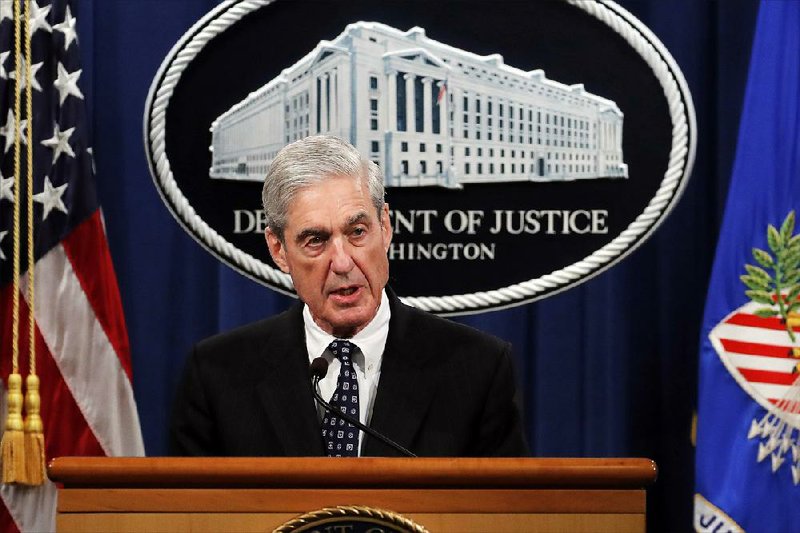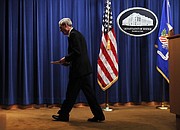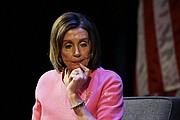WASHINGTON -- Robert Mueller, the special counsel, declined Wednesday to clear President Donald Trump of obstruction of justice in Mueller's first public characterization of his two-year investigation into Russia's interference in the 2016 presidential election.
"If we had had confidence that the president clearly did not commit a crime, we would have said so," Mueller said, reading from prepared notes behind a lectern at the Justice Department.
Mueller made clear that his team never considered indicting Trump because the Justice Department prohibits the prosecution of a sitting president.
"Charging the president with a crime was therefore not an option we could consider," Mueller said. He said such an action would be unconstitutional.
He also noted that the Constitution "requires a process other than the criminal justice system to formally accuse the president of wrongdoing."
The special counsel's statement largely echoed the central points of his 448-page report, which was released last month with some redactions. But his remarks, just under 10 minutes long, were noteworthy given that he had carried out the investigation without speaking a word publicly.
Mueller, a former FBI director, said Wednesday that his work was complete and he was resigning to return to private life.
Trump and his supporters seized on the news conference to declare Mueller's investigation over and call for the country to move on.
Trump said in a tweet, "Nothing changes from the Mueller Report. There was insufficient evidence and therefore, in our Country, a person is innocent. The case is closed! Thank you."
[RELATED: Read full text of Mueller's remarks]
Democrats, meanwhile, pointed to Mueller's refusal to exonerate Trump, saying the onus was now on the House and Senate to fully investigate Trump's actions.
Attorney General William Barr has said Trump was innocent of "obstructive conduct." He also suggested that the president may have been merely acting out of frustration, not corrupt intent, during episodes of possible obstruction described in Mueller's report.
Mueller, by contrast, noted that although his office did not "make a determination as to whether the president did commit a crime," he said, "the matters we investigated were of paramount importance."
He added, "When a subject of an investigation obstructs that investigation or lies to investigators, it strikes at the core of their government's effort to find the truth and hold wrongdoers accountable."
Barr suggested at one point that the special counsel should not have collected evidence against Trump if he only intended for Congress to review it. But Mueller defended his inquiry as wholly justified.
The investigation was necessary both to preserve evidence and to hold accountable anyone who might have conspired with the president and could face criminal charges, he said.
He also said that former Deputy Attorney General Rod Rosenstein's order appointing him specifically authorized him to investigate actions to interfere with his inquiry.
Mueller said his news conference was his final word on his investigation.
He did not rule out testifying before Congress. But he seemed to warn lawmakers that they would not be pulling more detail out of him. His report is his testimony, he said.
"So beyond what I have said here today and what is contained in our written work," Mueller said, "I do not believe it is appropriate for me to speak further about the investigation or to comment on the actions of the Justice Department or Congress."
Despite Mueller's comments, Democratic House leaders vowed to continue to seek his testimony.
"Given that the president has not been cleared of wrongdoing, and given the seriousness of Russia's interference in our democracy, I believe that the American people deserve to hear testimony from the special counsel about his report and the report's conclusions," said Rep. Steny Hoyer of Maryland, the No. 2 House Democrat.
'CASE CLOSED'
Trump's aides, who were informed late Tuesday that Mueller intended to deliver a statement, pointed to Barr's public statements about the president's behavior. After Mueller declined to decide whether the president had committed a crime, Barr decided that evidence against the president was insufficient to warrant a criminal prosecution -- a decision he reached jointly with Rosenstein.
White House press secretary Sarah Huckabee Sanders told reporters that further investigations by Congress are unnecessary because "it's already been done." She added: "We consider this case closed."
Democrats said Mueller's remarks only underscore the need for Congress to follow up with subpoenas and hearings.
"If he had any evidence that the president was not guilty, he would have let us know," said House Speaker Nancy Pelosi. "But he didn't. He didn't. And I think that was very, very important."
She said Congress should continue to press for more information, including for passages in the report that were redacted to protect grand jury material, ongoing criminal investigations or classified information.
Other Democrats renewed their demands for the first steps toward impeachment.
"The next step is for the House Judiciary Committee to open an impeachment inquiry to formally begin consideration of whether or not articles of impeachment should be filed," Rep. David Cicilline, D-R.I., a member of the Judiciary panel and Pelosi's leadership team, said in a statement. "The opening of this inquiry will allow the committee to collect evidence, compel the attendance of witnesses, and decide how to proceed."
Sen. Cory Booker, D-N.J., a member of the Senate Judiciary Committee who is running for president, wrote on Twitter: "Robert S. Mueller III's statement makes it clear: Congress has a legal and moral obligation to begin impeachment proceedings immediately." It was the first time Booker spoke out for impeachment.
Judiciary Committee Chairman Jerrold Nadler, D-N.Y. -- who has stopped short of advocating for impeachment in public but has privately pushed Pelosi to allow an inquiry to begin -- also said Wednesday that Congress must act.
"Given that special counsel Mueller was unable to pursue criminal charges against the president, it falls to Congress to respond to the crimes, lies and other wrongdoing of President Trump -- and we will do so," said Nadler. "No one, not even the president of the United States, is above the law."
On the Republican side, Lindsey Graham of South Carolina, the chairman of the Senate Judiciary Committee, said Mueller "has decided to move on and let the report speak for itself. Congress should follow his lead."
Mueller began his statement by reviewing the highlights of how Russia had tried to influence the results of the 2016 election. He described how Russian operatives hacked into Democratic computers and released documents through WikiLeaks in order to damage the campaign of Hillary Clinton, whom he described only as a presidential candidate.
He returned to that theme at the end of his speech, emphasizing the gravity of Russia's attack on the American political system.
"I will close by reiterating the central allegation of our indictments -- that were multiple, systemic efforts to interfere in our election," he said. "And that allegation deserves the attention of every American."
While he made no reference to Trump's denunciations of his work as a "political hoax," he described his investigation as "fair and independent." He said the prosecutors and FBI agents on his team were public servants "of the highest integrity" and thanked them for their work.
Republicans, meanwhile, said they were looking ahead to the results of a review into the origins of the counterintelligence investigation that ultimately triggered Mueller's appointment. Barr has assigned the review to the U.S. attorney in Connecticut but is personally overseeing it.
Department officials say he wants to understand on what basis the FBI first began investigating ties between the Trump campaign and Russia in the summer of 2016.
Barr has also said he is concerned about the justification for "spying on Americans." The FBI sought a court order to conduct surveillance on a former Trump campaign aide, partly on the basis of research that was paid for by a law firm hired by Democrats.
Trump has praised the review, saying the investigation into him and his campaign was never justified.
Information for this article was contributed by Sharon LaFraniere of The New York Times; by Eric Tucker, Michael Balsamo, Chad Day, Mary Clare Jalonick, Lisa Mascaro and Jonathan Lemire of The Associated Press; and by Matt Zapotosky, Devlin Barrett, Felicia Sonmez, Rachael Bade, Carol D. Leonnig, Karoun Demirjian, Ellen Nakashima and Mike DeBonis of The Washington Post.
A Section on 05/30/2019


